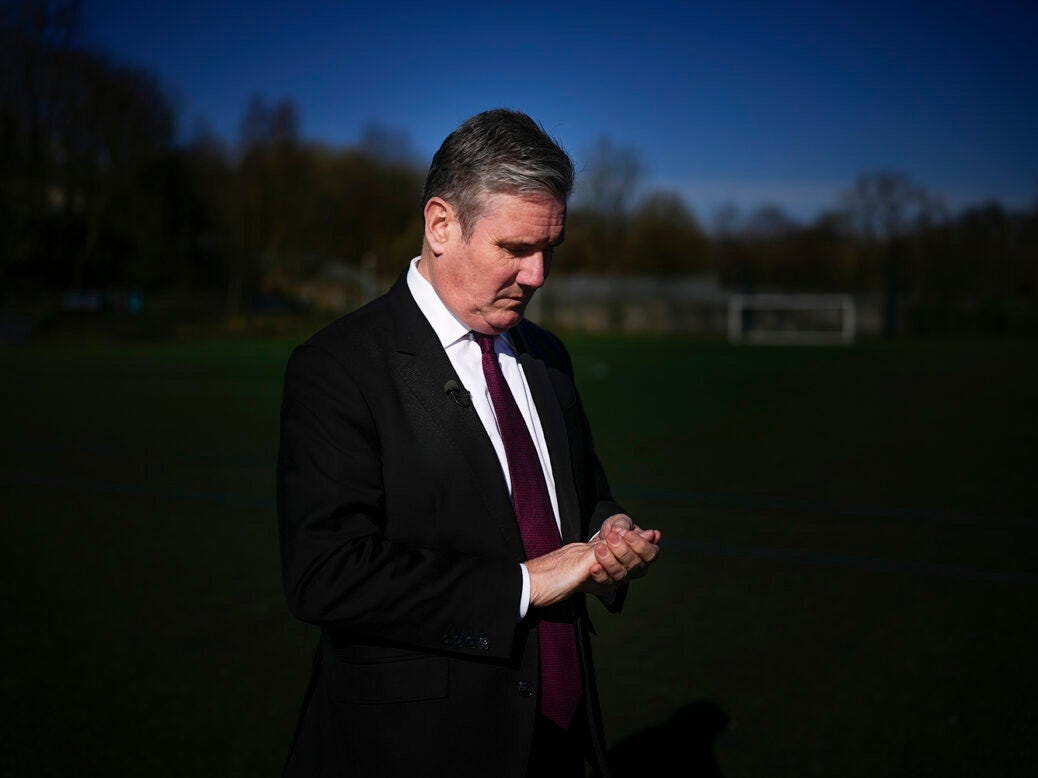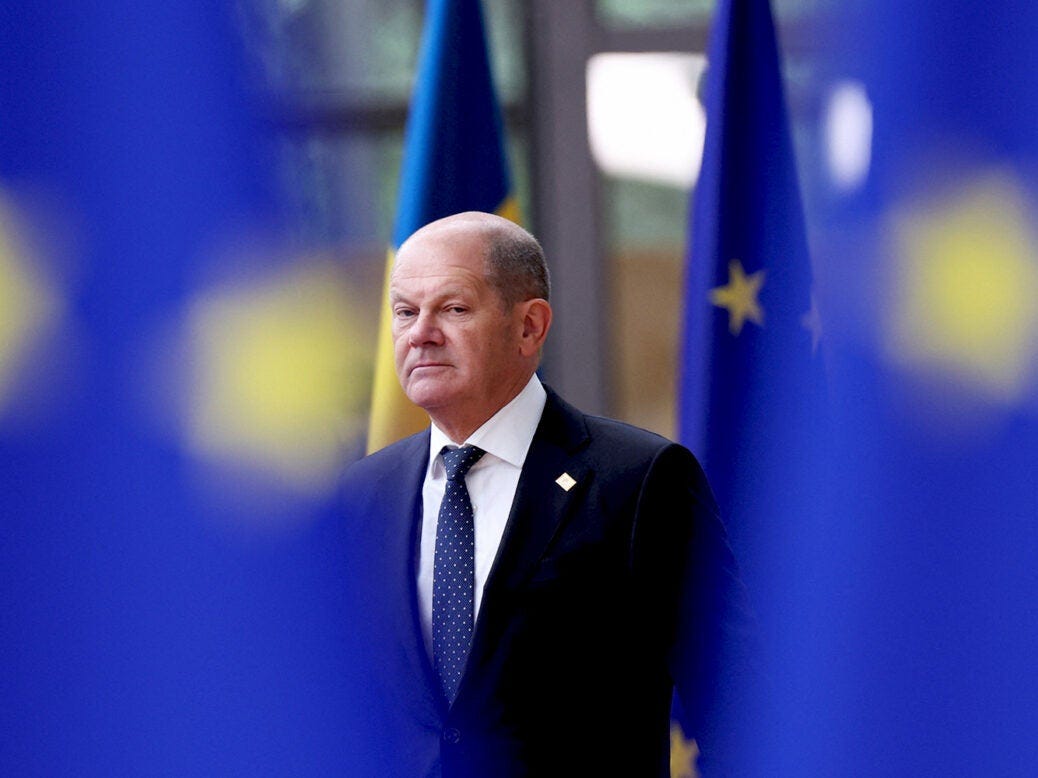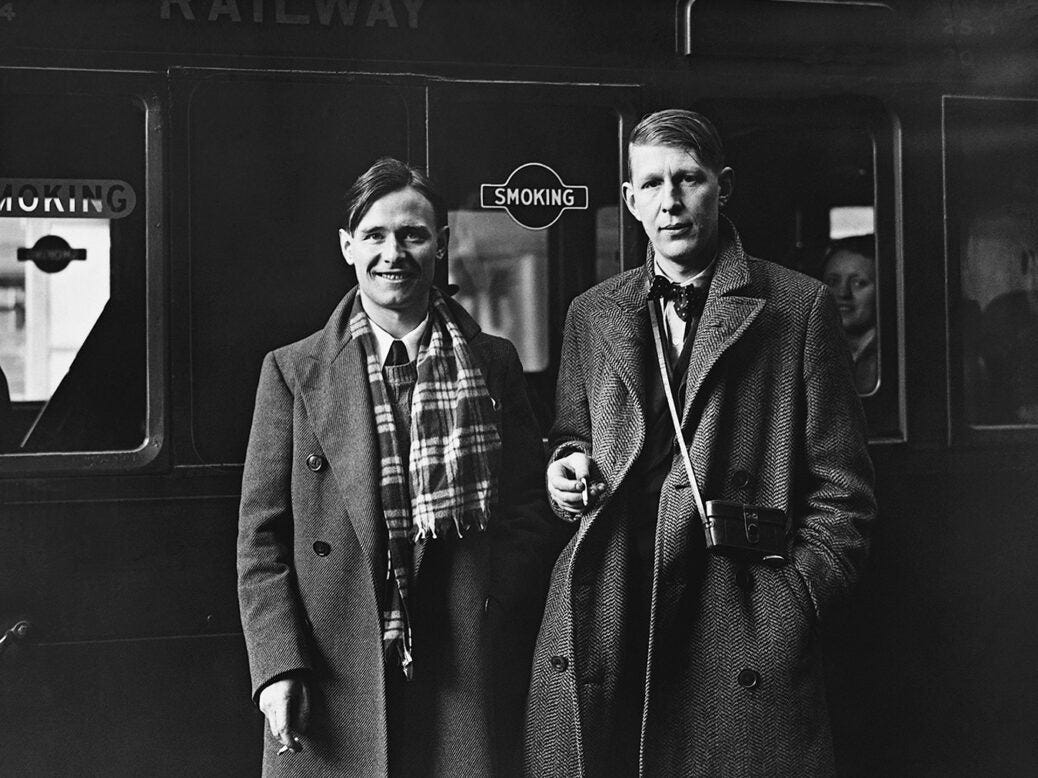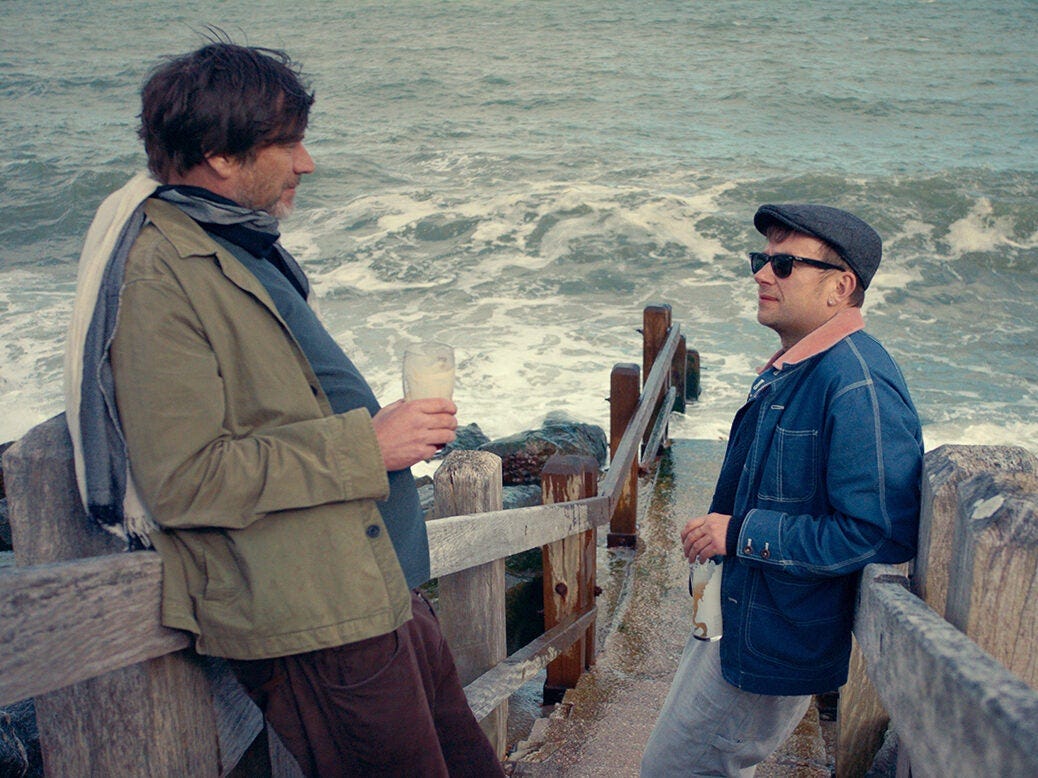The Saturday Read: Political football
Inside: Political nightmares, Nigel Farage’s populist revolt, the Gen Z election, German decline and Taylor Swift in London.
Good morning. Welcome to the Saturday Read, the New Statesman’s guide to politics, culture, books, and ideas. This is Jason, together with Finn, Nicholas, Pippa and George.
We are less than two weeks away from the beginning of a new political era as the Conservatives prepare for a humiliating, abject, and entirely deserved defeat on 4 July. This has been a protracted campaign of masochism for Rishi Sunak: as the days drag on his personal approval ratings are only going in one direction. And he can do nothing about it. What will come next? And how to fix Britain, with its diminished state capacity, fragile civil service, and economic, spatial and social divisions? In our cover story this week, leading economists and thinkers – including Paul Collier (whose new book, Left Behind, I reviewed here), Mariana Mazzucato and Hans Kundnani – offer their prescriptions for national renewal. See what you think of them.
Now for some football. In the long, hot summer of 2006, I was sent by the Observer newspaper to write about the World Cup in Germany. I had a spacious apartment in Berlin, opposite the Adlon Hotel and a short walk from the Brandenburg Gate. On those mornings when I wasn’t travelling, I’d buy some newspapers and magazines from the Hauptbahnhof and spend a few hours reading them at a pavement café. As an accredited journalist, I also had a complimentary first-class train pass and spent much of my time touring the country and watching some football, including several England matches. Under the leadership of Sven-Göran Eriksson, England were very much as they are today: unconvincing, cautious, passive and forced to defend deep. They eventually lost to Portugal in the quarter-finals following the inevitable penalty shoot-out capitulation. Will Gareth Southgate’s side improve as the tournament goes on? No one doubts the quality of many of the players. But what of the system, the style imposed on them by the coach? He is a conservative man whose response to the dismal draw with Denmark in Frankfurt on Thursday evening was to lament the absence of Kalvin Phillips, Manchester City’s unwanted midfield enforcer, most recently seen on loan (and on the substitutes’ bench) at West Ham. If Phillips is the answer, I wonder what the question was? Enjoy the weekend.
The picks…
Good morning, Finn here. Here’s a selection of our favourite pieces from the New Statesman this week: from Blur’s Britpop renaissance to Farage’s Gen Z dilemma. Halfway through, Nicholas has some thoughts on a grammatical Twitter row from this week, and I’ll be signing us off by making the economic case for Taylor Swift’s Eras tour.
1—“The campaign is being conducted in prose, while the result will read like apocalyptic poetry.”
Phil Tinline’s refocusing of modern British history through the lens of “political nightmares” has already proven highly influential. In our weekend essay, he applies this perspective to the very recent past. We all accept that the economic insecurity, political chicanery and profound shoddiness of the 2010s and early 2020s represent a contemporary nightmare. The question of this election is whether Labour is selling a dream that can replace it? NH
Do they fully break from the restraints of post-1979 orthodoxy, tell the wealthy they must contribute more – at least while we wait for growth – and use the money to prove to a cynical public that politics can make life better? Or do they risk letting a future election trigger yet more apocalyptic poetry, as the populist right, its hour come round at last, gets its second coming? Because in that case, the poetry writes itself: a shape with Tory body and head of Farage slouches towards Westminster to be born.
2—“Nigel Farage wants to become prime minister. Nobody is laughing.”
There exist two different emotional reactions to the spectre of British national decline: the sensible left-centrism of Starmer’s Labour, driven by a yearning for sense and stability; and an angry thirst for radical change, now channelled by Nigel Farage’s Reform. Should Labour fail in office, Andrew Marr writes, the latter may well win. PB
If Farage enters parliament as one of just a handful of Reform MPs and yet has the support of, say, one in five voters, then we are in a new political and media world. Farage will get a national pulpit even bigger than the one he’s so far enjoyed during the campaign. Running on a platform of huge tax and spending cuts, and “kick the migrants back” – a kind of ultra-Tory rightism – he will have the support of much of the Telegraph Group and GB News.
3—“In the eyes of the Yanks, the British press is scurrilous and shallow”
The culture war brewing at the Washington Post exploded yesterday, with the planned appointment of Fleet Street doyen Rob Winnett to editor of the paper cancelled at the eleventh hour. Finn argued that this Anglo-American clash of values proves one thing: Britain and America are very different places. NH
The spiky attitude required of a British hack is anathema to refined American manners; the lofty principles of the American reporter collide with the gonzo edge of the British red tops; lackeys of stateside newsrooms stand up to their superiors while the British footmen are entirely obsequious to the whims of the editor… But the very fact that there is such cultural discordance should disabuse the world of any anxiety that England is Americafied. It has never been so.
4—“2024 may have been the first and irreversible step in the impending historical decline.”
Thirty-five years after the fall of the Berlin Wall, Germany is once again divided between east and west. The anti-establishment, anti-EU trends of the country’s recent European elections were more pronounced in the east. Western Germany’s ancien régime says that’s because easterners are fascist ingrates. Wolfgang Streeck offers a more realistic view. GM
The crises eroding confidence in mainstream-democratic institutions are hitting East Germans more than West Germans; the West German political institutions had more time in better times to build up loyalties in West than in East Germany; and neoliberal admonitions to be flexible and adjust to structural and cultural change remind East Germans of the economic upheaval they experienced in the 1990s, an upheaval that West Germans had been spared. Urged by their new governments to get ready for yet another Zeitenwende, in the name and for the sake of globalisation and modernisation and not least under the auspices of “Europe”, they obviously are less inclined to assume that, since things have been going nicely in the past, they will go nicely this time as well.
To enjoy our latest election news and analysis with unlimited access to our coverage click here to subscribe to the New Statesman. You’ll enjoy all of the New Statesman online content, ad-free podcasts and invitations to NS events.
A mild Twitterstorm of pedantry broke out this week over the future Queen’s English. Thanking the public for their support in the past months, the Princess of Wales wrote: “It really has made the world of difference to William and me,” a flawless and heart-warming sentence. But not according to the British public, the majority of whom, when polled by YouGov, said that Catherine should have said “William and I”. Cue a wave of despair from linguistic prescriptivists (“Jesus wept,” wrote one Twitter user), and a roar of defence from descriptivists.
In his book The King’s English – perhaps the only study of grammar and usage which also reads like a comic novel – Kingsley Amis refers to the improper use of “and I” as a “venerable howler”, a “hyper-urbanism” resulting from the impression that to say “I” is “dignified, upmarket and sort of Oxford-accented”, “an indulged desire to be more correct than correct or posher than posh”. But in such a class-obsessed country, this seems a rather sympathetic explanation. And in the same entry he notes even Shakespeare, who had to deal with plenty of class snobbery for his “small Latine, and lesse Greeke”, was susceptible to this flaw, “between-you-and-I-ing like an American college graduate” in one speech from Julius Caesar. Perhaps this mild error really is forgivable – because it is certainly ineradicable.
— Nicholas
We believe everyone deserves access to quality social care in the comfort of their own home.
At the heart of this are our Care Professionals – dedicated individuals who, because they’re valued, deliver exceptional care that transforms lives. Earning 50% above the sector’s average.
Now public sector leaders can access a digital solution to social care capacity, benefitting the workforce, freeing up resource and creating local jobs for local people. Discover Curam
5—“A triumph of sympathetic understanding.”
The former poet laureate Andrew Motion has written an immensely pleasurable account of the real Christopher Isherwood. His was a life lived in pursuit of authenticity, and if that sounds modern for a man who died in 1981, well, he was. GM
The greatest achievement of Isherwood’s personal life was to see all aspects of his existence as a search for the best way to manifest his truest feelings and most fundamental beliefs. It was an effort that has attracted a certain amount of incredulous mockery over the years, but in essence it was noble, and bravely realised. It is also inseparable from the most important elements in his work – not just the rapprochement between intensity and clarity in his style, but the increasingly sharp focus on his gay identity. His candour, and his courage in the face of prejudice as well as legal constraint, blazed a trail for younger writers on both sides of the Atlantic. Always nimble-minded, shimmering with light touches, mischievously disdainful of solemnity, Isherwood’s purpose was constant and absolutely serious: to be equally honest in art and life.
6—“My first thoughts were of Morrissey’s 1992 song ‘The National Front Disco’.”
If Britain’s Gen Z are politically apathetic, France’s are much more decided – a third of them threw their support behind Marine Le Pen’s National Rally at the European elections. To understand this unlikely youth revolt, Andrew Hussey attended one of the party’s Paris rallies, and looked into “Les Horaces”, the secretive establishment cabal that has masterminded National Rally’s rise. NH
What is clear, however, is that a new generation has emerged, led and personified by Jordan Bardella (born 1995), which doesn’t care about the RN’s murky past – which is well beyond their lifetime anyway – and who will be very soon be shaping the future of France. This is a cohort influenced more by recent Islamist terrorism than by memories of the Fourth Republic, and is now trying to restore its own faith in a country which seems to have lost its confidence.
7—“The lost boys of Britpop”
Blur’s reunion gigs at Wembley last summer were triumphant: a sharp reminder that even with their ageing joints (and Dave Rowntree on crutches), the ur-group of Britpop never lost their magic. Tom Gatti looks into the psychodrama of the band’s very middle-aged reunion. FMcR
Alex James looks pleased not to be running his cheese factory or explaining to his kids why he wrote in his memoir that he spent £1m on champagne and drugs in the 1990s. Then Graham Coxon materialises. He has been playing music outside Blur for more than 20 years, and currently has a band with his partner, Rose Elinor Dougall – but, ushered into Damon Albarn’s home studio, he is bouncing around and tinkering like a kid. The pair don’t seem able to exchange anything resembling full sentences but they keep putting their arms around one another and the affection is palpable. Finally, Dave Rowntree shows up: he has been a lawyer and is now running to be Labour MP for Mid Sussex. Tea is served. Hopefully, he asks, “Is the cake gluten-free?” Alas, it isn’t. Poor Dave.
8—“Welcome to the first Gen Z election.”
Generational inequality has become a modish vector for analysing British politics, but it has largely been absent from an election campaign that has reverted to Labour hedging and Tory sniping. Given that eight million Gen Z yoofs have now attained voting age, I took the measure of my generation’s nascent politics, and asked whether we could turn to the radical right like our continental cousins. NH
There is no especially authoritarian or fascistic streak in Gen Z – baggy corduroys are no good for goose-stepping anyway. The truth is that the young people… have known nothing but democratic deficit their whole adult lives. Westminster in particular has been through an exceptional period of institutional inefficiency: peacetime coalition; chaotic plebiscites; a minority government brought to its knees by Cromwellian levels of parliamentary factionalism. But despite the havoc, the same underlying torpor has continued.
George’s Best of the Rest
Gore Vidal said, “Every time a friend succeeds, a little something inside me dies.” No such turpitude at the Saturday Read, and certainly not towards its own founders. It’s great to see Harry breaking America and Will continuing to sound Britain’s psyche.
Irish Times: US executive pay rises at fastest rate in 14 years.
Reuters: Famine and disease spreading in Sudan.
BBC: Putin visits Vietnam.
Ted Gioia: Picasso made me a strategy consultant. So that’s who we should be blaming for the Big Con.
Jeffrey Meyers: When Evelyn met Graham.
Kate Hext: Stand up for decadence. Shouldn’t that be slouch louchely for decadence?
Hank Shteamer: How Cage the Elephant’s frontman nearly lost it all.
Valerie Stivers: Rachel Cusk’s cruel misandry.
World War II veteran is also only living son of a US Civil War soldier.
Hotdog eating champ banned for turning vegan. Et tu, hotdog eating champ?
Erling Haaland caught up in armed beach raid. Still scores a hat trick.
And with that…
Last night, three members of the New Statesman’s team decamped to Wembley for the first show of Taylor Swift’s London leg of the Eras tour. As Anna Leszkiewicz notes in her review of the concert, the sheer scale of the event is difficult to comprehend: north London has been besieged by legions of fans; Zone 4 has never seen so many cowboy boots; I think my ears are still ringing from the decibels. I have never been to an American megachurch but I imagine the after-effects are not dissimilar.
It is remarkable that one person wields such cultural influence. “Taylor Swift is the music industry,” Bloomberg News claimed in 2014. A decade on, and that doesn’t quite capture it any more. Six studio albums later and the highest grossing tour in history – not to mention her general ubiquity – Swift is more than just the music industry. She’s consumed the entire culture.
Swift might represent the last vestiges of a monoculture – a rare phenomenon in a world increasingly siloed by social media. But she’s also emerged as a rather useful economic tool. Last month Portugal’s statistics office (I can’t get enough of their stuff) reported an accelerated inflation rate coinciding with Swift’s performance on the 24 and 25 May. Last year, Ireland’s minister for public expenditure, Paschal Donohoe, cautioned the service industry against exploiting the spikes in demand that Swift’s arrival next week will cause. In May, Barclays estimated that consumers in the UK might spend nearly £1bn attending the tour this summer. Swift is no longer a cultural icon: she’s a dependable economic stimulus. Maybe the IMF should have a say in where she plays.
That’s all for now. Thanks for reading and see you next Saturday.
— Finn
The New Statesman is home to the finest writing on politics, culture and ideas. To stay up to date, subscribe using the link above.























Your idea that a fix or fixes can be achieved seems to me given the state of global economics and security little short of naive wand waving.